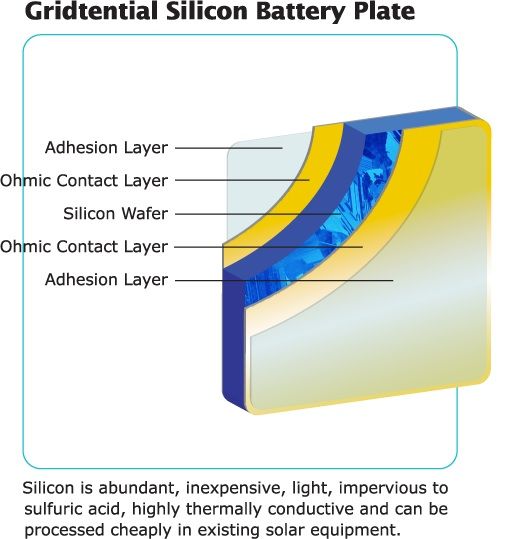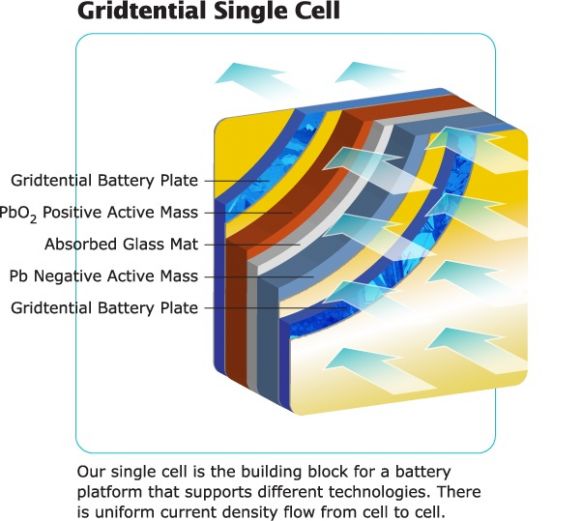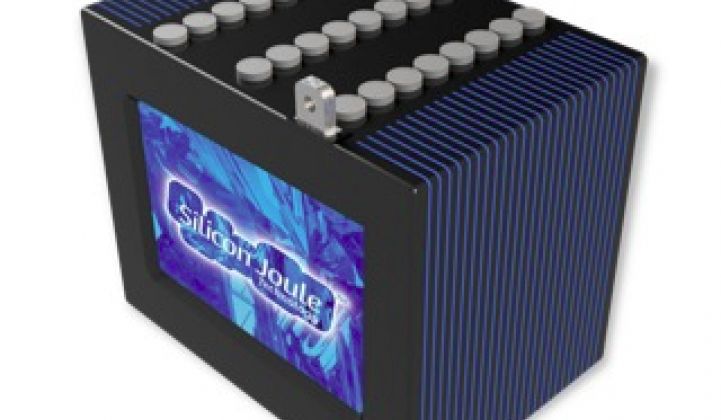Gridtential, an energy storage startup developing lead-acid battery technology, just won a vote of confidence in the form of $6 million from lead-acid industry giants and strategic investors including East Penn Manufacturing and Crown Battery Manufacturing (a supplier of deep-cycle batteries since 1926). Leoch International, a large lead-acid battery exporter in China, and Power-Sonic, a global battery distributor, also invested.
Gridtential replaces the lead grid inside a traditional lead battery with a plated silicon wafer similar to a solar cell.
Kevin Smith, East Penn’s VP of technology, told GTM that Gridtential has made "remarkable strides" in demonstrating advancements from the traditional lead-battery design. East Penn is a 70-year-old, privately held, "very vertically integrated" lead-acid battery builder headquartered in the town of Lyon Station, Pennsylvania (population: 350). Smith said that the company's decision to make a venture investment in a startup was "an anomaly," but added that Gridtential had the potential to prolong the leadership of lead-acid technology and disrupt some portions of the market.
Smith also pointed out that while Tesla touts its Gigafactory, the lead-acid industry and East Penn have already reached that type of volume and scale -- the East Penn facility will build 40 million batteries for automotive, telecom and other motive applications. The company claims, in a release, that the lead-acid global manufacturing base is "70 times the size of Tesla’s Gigafactory efforts."
Smith said the scalability of the Gridtential design allows for 48-volt operation, which is increasingly in demand as automobiles provide more creature comforts and safety features such as stop-start energy regeneration and engine shutoff at higher speeds. Gridtential claims the 48-volt battery market for hybrid vehicles is a $30 billion global opportunity.
While GTM focuses much of its energy storage coverage on lithium-ion technology, Gridtential's new battery architecture keeps the traditional benefits of lead batteries (lower cost, recyclability, wide temperature range, safety and long cycle life) while developing lithium-like performance benefits, including fast charge/discharge and deep depth of discharge.
Christiaan Beekhuis, Gridtential co-founder and CEO, told GTM in a previous interview, "If the lead industry does not push forward faster, lithium, despite its well-publicized safety, cost and recycling challenges, could dominate" markets now owned by lead-acid.
Gridtential and its licensing partners will begin beta production of its batteries this year. The company claims its batteries can be "one-third lighter than existing advanced lead batteries with performance up to five times in power density."
Ray Kubis, Gridtential's recently installed chairman, said in a release, “Rather than spending our time and efforts on continuous fund raising, we’ve chosen a capital-light path with an existing global network of suppliers that will swiftly exceed giga-scale production of advanced lead-based batteries to meet rapidly growing application demand." Kubis has held leadership positions at EcoBat, General Battery, EnerSys and Johnson Controls.
"Advanced lead batteries, especially higher-voltage silicon-lead bipolar batteries, can compete with lithium batteries, and of course they are safer and fully recyclable," says Kubis.
Gridtential looks to provide a drop-in replacement for the standard lead-acid battery. The startup keeps the form factor and charge process intact but drastically alters the internal battery architecture for a higher depth of discharge, longer life and lower price, according to the CEO.
As we reported previously, the bipolar architecture uses the entire area of a silicon wafer as the conductor combined with traditional lead paste and sulfuric acid -- stacked to build "a recognizable cell," according to Beekhuis. Leveraging the existing 125-millimeter silicon wafer and supply chain, Gridtential is able to take advantage of silicon's thinness, light weight and high thermal conductivity to extract better charge-discharge performance and avoid fouling of the plates or stratification of the electrolyte. Gridtential's cells are stacked to build a battery of the desired voltage. "It's scalable and simple," said the CEO.
The traditional lead-acid battery is monopolar. Few bipolar batteries have made it to market, according to the CEO, because of thermal and other issues. Gridtential's design results in a 30 percent to 90 percent reduction in the amount of lead. Uniform current distribution helps improve cycle time and allows for a 2- to 4-hour discharge versus the 20-hour traditional range.
The company will manufacture plates and "move forward as a licensee and seller of plates to achieve scale at low capital intensity," said the CEO. Potential licensees include the leaders in the lead-acid battery market such as EnerSys, East Penn, Exide and Johnson Controls.
Here are a few slides from a recent Gridtential PowerPoint presentation.





